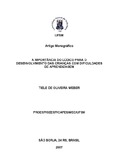| dc.contributor.advisor | Castro, Sabrina Fernandes de | |
| dc.creator | Weber, Tiele de Oliveira | |
| dc.date.accessioned | 2019-08-26T14:13:33Z | |
| dc.date.available | 2019-08-26T14:13:33Z | |
| dc.date.issued | 2007-11-24 | |
| dc.date.submitted | 2007 | |
| dc.identifier.uri | http://repositorio.ufsm.br/handle/1/18017 | |
| dc.description | Artigo (especialização) - Universidade Federal de Santa Maria, Centro de Educação, Curso de Especialização em Educação Especial: Déficit Cognitivo e Educação de Surdos, RS, 2007. | por |
| dc.description.abstract | The present work was developed during the Specialization course on Special Education, of
Santa Maria Federal University in convention with Áttila Taborda Foundation – URCAMP –
São Borja’s campus. We developed this search with the purpose of verifying on specific
literature the importance of playful to the development of children with learning difficulties
and how its utilization can benefit learning procedure, seeking this way, favour the
development of efficacious pedagogical practices to their knowledge construction. Thinking
on these educative practices, we believe that playful is important to any human being and it
can’t be seen only as entertainment. To the realization of this work, we used as
methodological approach the bibliographical search. This way, we analyzed different authors
and this allowed us to have a wide vision about the subject. The development of playful
aspect is seen as an easy way of learning, of personal, social and cultural development,
allowing the whole development of the children, even through these activities they develop
themselves affectively. The educator has the role of mediator on this stage, taking to the
students the utilization of playful activities on his/her daily work, seeking interaction between
both. Playful is an inherent activity to the human being and builder of significant learning, in
which the students develop the interest by the proposal activities. The collectivity on their
execution provides intellectual growth and physical development, and this leads to the
construction of human being autonomy. Thus, this research does not deplete the subject, in
contrast, opportunity new searches, new knowledge but it waits to assist professors, parents
and all those that in day-by-day are come across with new situations of learning and search to find a support. | eng |
| dc.language | por | por |
| dc.publisher | Universidade Federal de Santa Maria | por |
| dc.rights | Acesso Aberto | por |
| dc.rights | Attribution-NonCommercial-NoDerivatives 4.0 International | * |
| dc.rights.uri | http://creativecommons.org/licenses/by-nc-nd/4.0/ | * |
| dc.subject | Educação especial | por |
| dc.subject | Lúdico | por |
| dc.subject | Dificuldades de aprendizagem | por |
| dc.subject | Special education | eng |
| dc.subject | Playful | eng |
| dc.subject | Leaning difficulties | eng |
| dc.title | A importância do lúdico para o desenvolvimento das crianças com dificuldades de aprendizagem | por |
| dc.title.alternative | The importance of playful to the development of chlidren with learning difficulties | eng |
| dc.type | Trabalho de Conclusão de Curso de Especialização | por |
| dc.degree.local | São Borja, RS, Brasil | por |
| dc.degree.specialization | Educação Especial: Déficit Cognitivo e Educação de Surdos | por |
| dc.description.resumo | O presente trabalho foi desenvolvido durante o Curso de Especialização em Educação
Especial, da Universidade Federal de Santa Maria, em Convênio com a Fundação Áttila
Taborda – URCAMP – Campus de São Borja. Desenvolvemos essa pesquisa com o objetivo
de verificar na literatura específica a importância do lúdico para o desenvolvimento das
crianças com dificuldades de aprendizagem e como a utilização do lúdico pode beneficiar o
processo de aprendizagem, buscando dessa forma, favorecer o desenvolvimento de
práticas pedagógicas eficazes à construção de seus conhecimentos. Pensando nessas
práticas educativas, acreditamos que o lúdico é importante para qualquer ser humano e não
pode ser visto apenas como diversão. Para a realização deste trabalho, utilizamos como
abordagem metodológica a pesquisa bibliográfica. Assim, analisamos diferentes autores, o
que nos permitiu ter uma visão ampla sobre o assunto. O desenvolvimento do aspecto
lúdico é visto como facilitador da aprendizagem, do desenvolvimento pessoal, social e
cultural, possibilitando o desenvolvimento integral das crianças, já que através dessas
atividades elas, também, desenvolvem-se afetivamente. O educador tem o papel de
mediador nesta etapa, levando aos educandos a utilização de atividades lúdicas em seu
trabalho diário, buscando uma interação entre ambos. O lúdico é uma atividade inerente ao
ser humano e construtora de aprendizagem significativa, na qual os educandos
desenvolvem o interesse pelas atividades propostas. A coletividade na execução destas
proporciona crescimento intelectual e desenvolvimento físico, o que leva à construção da
autonomia do ser humano. Assim, esta pesquisa não esgota o assunto, ao contrário,
oportuniza novas buscas, novos conhecimentos mas espera auxiliar professores, pais e
todos aqueles que no dia-a-dia deparam-se com novas situações de aprendizagem e
buscam encontrar um apoio. | por |
| dc.publisher.country | Brasil | por |
| dc.publisher.initials | UFSM | por |
| dc.subject.cnpq | CNPQ::CIENCIAS HUMANAS::EDUCACAO | por |
| dc.publisher.unidade | Centro de Educação | por |



